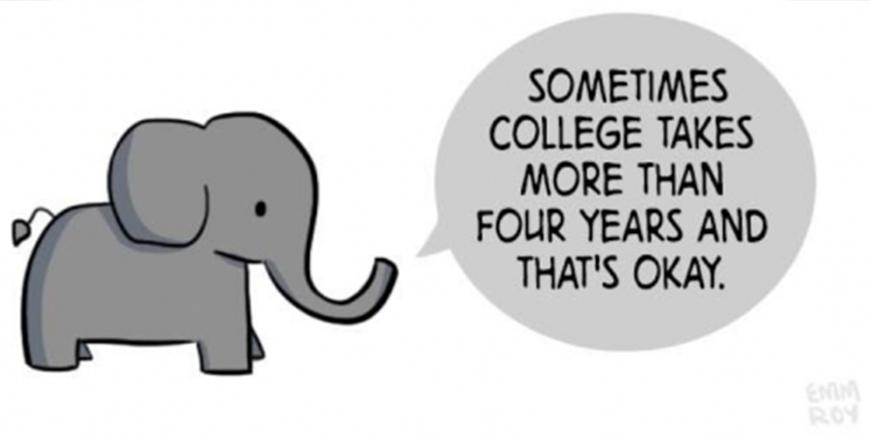
University should take 4yrs in total. Scratch that. It MUST take 4yrs and only 4yrs. This is a commonly held belief among university students. Many feel that extending their degree is impossible, even disgraceful. However, by sticking to the 4-year standard you can actually miss out on a lot of opportunities. So, before you prepare to rush your way through your degree read the following four reasons why there’s no rush to graduate.
Deciding Your Major
Some students have a clear idea of what they want to major in. If you do not belong to that group, you are not alone. Furthermore, coming into university without a plan can be a blessing as you can experiment with diverse subjects and topics and then choose the one you want. To allow yourself to make this decision, you need to allow yourself the time to experiment with courses. Try out different classes in your first and second year, volunteer for different projects and activities, and choose something you are really good at and which makes you happy. This experimental phase might require more than a few semesters, but it will help you be sure of your plan. So, do not be afraid of taking more than four years if it means making the most of your university experience.
Unnecessary Classes
Once you have a plan in mind, you can choose classes according to it. Every student has a specific set of needs and requirements, and not all classes are beneficial to everyone. So, you need to pick out the right courses that will help you the most with your degree and future academic or professional pursuits. Sometimes this translates into enrolling into very few classes, or entirely skipping a semester or two, to avoid not-so-helpful-courses. Forget about the quantity of time and focus on the quality of your learning experience, that way you can make the most of your university experience.
Co-op Opportunities
Most students have part-time jobs to pull them through university, but co-op provides you with a unique opportunity to test the waters of your professional career. While co-op terms typically mention a semester’s worth of work, if you find something really promising, do not let the 4yrs-rule keep you from extending your co-op terms. Be open to taking full control of your academic and professional development, rather than letting the university guidelines make all the decisions for you. University guidelines are there to help keep you on track for your academic development, not to restrain it. Additionally, co-op opportunities can help you get your foot in the door for your future career. If you have browsed through a job portal, you must have seen almost every post asks for experience. Students end up feeling helpless when every entry-position comes with a “1yr experience” requirement. Lack of prior experience can lead many to take up jobs they are not interested in, or they are over-qualified for. An actual job experience seems to be a missing piece from a lot of freshly minted graduates’ resumes. Co-op provides you with that missing piece from your academic past. A relevant co-op work term can expand your job pool greatly. So, do not miss that opportunity to keep-up with a timeline.
International Academic Experience
SFU offers summer programs like the NATO field school. There are also several exchanges and transfer programs that the university provides within and outside of Canada. Being flexible with your timeline can also enable you to take advantage of these opportunities. Participating in field schools, provincial or international exchange programs can help you specialize in different subject areas while broadening your personal experiences. For example, the NATO field school combines school work with experiential learning, and this summer it is taking students to Belgium, Italy, and Latvia. It is a great opportunity for interested students to visit different NATO headquarters and defence colleges, to observe and meet with military personnel, policy advisors and diplomats. It also helps students from SFU meet with like-minded students from across Canada and in the destination countries, while exposing them to new places and cultures.
Personal Well-Being and Mental Health
The increasing workload, juggling of personal, professional, academic, and social life together can take its toll on anyone. There can also be unforeseen events, accidents, even illnesses, which can keep you from dedicating your full attention to your courses. If such an emergency crops up, do not be afraid of taking time off. Your personal health and well-being are of utmost importance and compromising on either will not benefit your work. I am a graduate student, and due to some unavoidable health complications last year, I have had to drop out of a semester of school. I can honestly tell you that taking more than usual time to finish my degree has not ended the world for me. In fact, it has helped me keep my grades up, as I did not push myself when I was not able to give my 100 percent.
There are lots of reasons that can scare you away from taking more than 4yrs. What would your parents say? What if your friends finish early? What about the cost? While these are all valid concerns, it is always best to remember that the university experience does not come repeatedly in your life, and it is meant to benefit you. So, think of what works best for you, and do not be afraid to give your degree the time you think you need for it.














